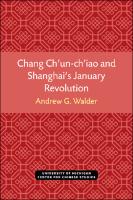Chang Ch’un-ch’iao and Shanghai’s January Revolution
Abstract
Shanghai’s January Revolution was a highly visible and, by all accounts, crucially important event in China’s Cultural Revolution. Its occurrence, along with the subsequent attempt to establish a “commune” form of municipal government, has greatly shaped our understanding both of the goals originally envisaged for the Cultural Revolution by its leaders and of the political positions held by the new corps of Party leaders thrust upward during its course—most notably Chang Ch’un ch’iao. At this interpretive level, the events in Shanghai seem to embody in microcosm the issues and conflicts in Chinese politics during the Cultural Revolution as a whole, while at the same time shaping our conception of what these larger issues and conflicts were. At the more general, theoretical level, however, the events in Shanghai provide us with an unusual opportunity (thanks to Red Guard raids on Party offices) to view the internal workings of the Party organization under a period of stress and to observe unrestrained interest group formation and mass political conflict through the press accounts provided by these unofficial groups themselves. The January Revolution thus provides us with an opportunity to develop better our more abstract, theoretical understanding of the functioning of the Chinese political system and the dynamics of the social system in which it operates. [1]
Keywords
Chinese studiesDOI
10.3998/mpub.19240Publisher
University of Michigan PressPublisher website
https://www.press.umich.edu/Publication date and place
2020Grantor
Series
Michigan Monographs In Chinese Studies,Classification
History


 Download
Download Web Shop
Web Shop